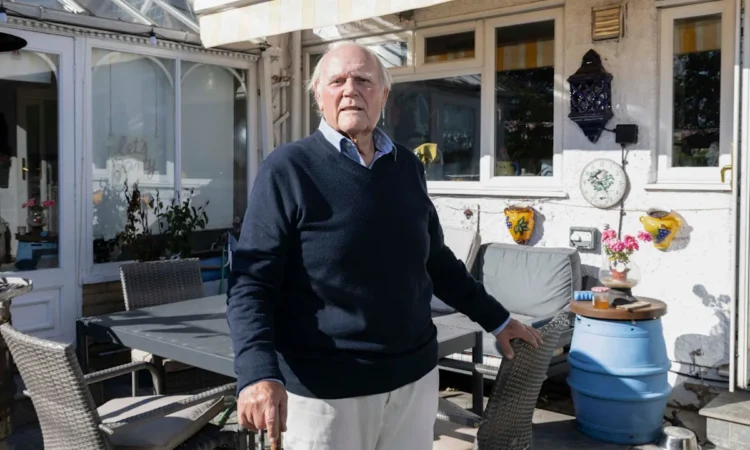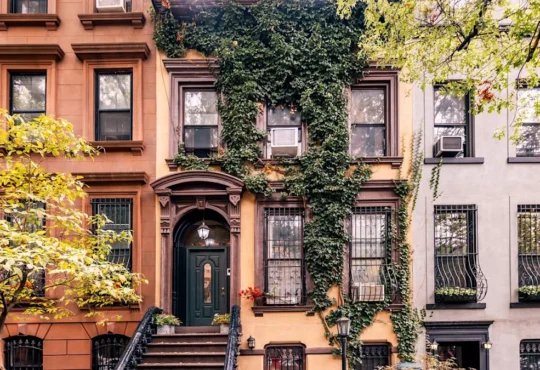
Peter Potter has spent 47 years transforming his three-bedroom house into the perfect family home, complete with a swimming pool in the south-facing garden.
But at the age of 78, after health issues left him in a wheelchair, he made the difficult decision to move from the home where he raised his children.
“Things were going to go downhill, not uphill. I realised the limitations of living on your own in a big semi-detached house. The stairlift breaks down every other week,” he says.
He had hoped to move into a bungalow, but a lack of stock has forced him to move into his daughter’s garage instead.
There are few bungalows in his area – Woodford in east London – and Mr Potter says one would end up costing him £700,000 for poor condition and poor location: “By the time you’ve paid stamp duty and moving costs, there is not a lot of equity left.”
With no options available, Mr Potter’s daughter, Sarah, decided to convert the L-shaped garage at the end of her garden. It is now a wheelchair-friendly flat with a small lounge, kitchen, bedroom and bathroom – all for the cost of £120,000.
Ms Potter, a 50-year-old single mother, says: “We decided to take the plunge. It ticks all the boxes [and] it was affordable. Having dad at the bottom of the garden will mean we can care for him, but we all have our own space.”
Hundreds of thousands of retirees across the country are struggling to downsize.
One in seven homeowners aged 55 and over have put plans to move on hold in the past two years, according to research by HomeOwners Alliance.
More than a third, 34pc, said this was because of a shortage of suitable homes, as critics warn the Government has “no viable strategy to cope with our ageing population”.
Bungalows make up just 2.5 million out of the 26 million homes in the UK, according to government data. Research by McCarthy Stone last year found that more than nine million older people want more to be built.
Mr Potter, who ran a roofing company for 40 years, says: “Bungalows went out of fashion for a while, but now they’re needed because we’ve got an awful lot of old people.”

Peter faced paying up to £700k for a bungalow in poor condition but couldn’t continue living in his big semi-detached house on his own – Jeff Gilbert
Five million want their next home to be a bungalow – double the existing stock levels.
Yet housebuilders are increasingly shunning single-storey properties. Research by the National House Building Council found bungalows made up 11pc of new homes in 1990, but by 2024 this had sunk to 1pc.
Dennis Reed, of senior citizens charity Silver Voices, says: “Many of our members would love to downsize if accessible local housing were available, therefore freeing up family homes.
“There appears to be no viable government strategy in place to cope with our ageing population, but they moan that too many older people remain in multi-bedroom houses. Where should we go when new developments usually only have one or two bungalows and doors too narrow for wheelchairs?”
Two in five people are now aged over 50 in England, according to Age UK, and this is forecast to increase by 19.3pc by 2044. The section of the population aged 85 and over is growing the fastest.
Nigel Bishop, of buying agency Recoco Property Search, says: “Over the past decades bungalows have evolved drastically to not only provide buyers with a convenient one-storey layout but higher levels of comfort and luxury.
“This improved reputation has made bungalows particularly sought-after by older buyers who wish to avoid stairs and embrace an independent lifestyle.”
The price of bungalows has risen steadily over the past 10 years from £257,433 in 2015 to £386,201, estate agency Hamptons has found. They made up just 7.5pc of all homes on sale this year.
Mr Bishop adds: “With the majority of bungalow buyers being retirees planning to downsize, this segment of the property market is dominated by house hunters who are not bound to a mortgage and are in a position to make an offer fast. This, in addition to the fact that demand outstrips supply, has made the market for bungalows extremely competitive.”
Competing with the young
But Jamie Freeman, buying agent at Haringtons UK, highlighted that the bungalow market is being crowded with younger families as well.
He says: “The snag is that downsizers are often competing with family buyers and even first-time buyers in some markets. Families are quick to snap up bungalows because they usually sit on generous plots and lend themselves to extensions or loft conversions.
“Once developed, they often return to the market as large detached houses, which is the very opposite of what downsizers are looking for. In other words, the pool of suitable homes is shrinking as bungalows are upgraded out of existence.”
However, bungalow hotspots do exist around the country. The PE postcode, covering north and west Cambridgeshire, is home to 62,100. Meanwhile, one in five of all homes in central, north and eastern Norfolk is a bungalow, according to Zoopla.
The property website now has the highest number of bungalows for sale on record – 28,957. The majority of them are in the South East.
Mr Bishop says: “Some of these may be inherited properties where families prefer to liquidate the asset rather than keep it as an investment as they might have done in the past, partly due to ever-increasing regulations and tax liabilities.”
He adds that the stalling property market may also mean that prospective bungalow buyers are struggling to sell a larger family home before being able to downsize.
Downsizers are bracing for Labour’s next Budget, after weeks of speculation over property taxes during the summer.
It has been suggested that the Government could charge capital gains tax on primary residences worth more than £1.5m.
Experts have warned that this would particularly hit downsizers, whose homes have vastly grown in value over several decades, many of whom are already reluctant to move because of the tax hit.
Paula Higgins, of the HomeOwners Alliance, says: “Our research shows that too many older homeowners feel stuck in homes that no longer work for them but struggle to find an appropriate alternative. There is a huge demand for bungalows, but hardly any get built anymore.
“With the UK’s rapidly ageing population, we hope the Government’s long-promised housing strategy looks at a better range of retirement housing, including single-storey solutions.”






